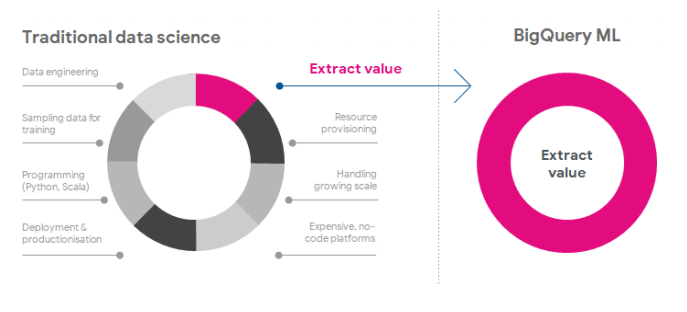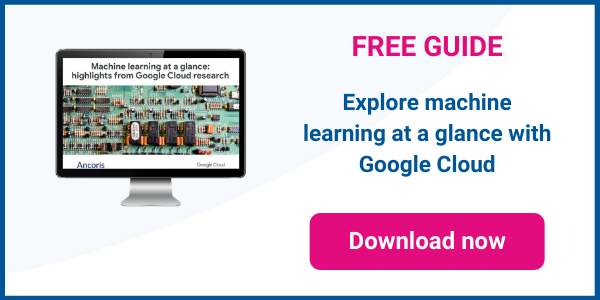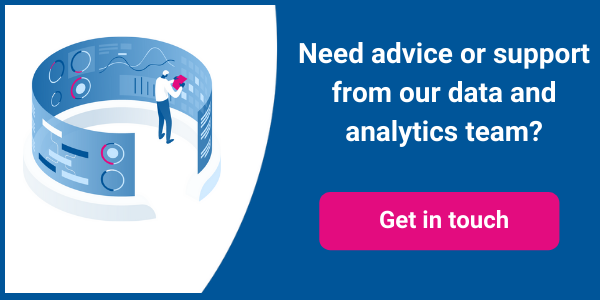Machine Learning (ML), a kind of artificial intelligence, is no longer the preserve of blue-skies researchers but has become a staple of business intelligence for all kinds of organisations. By providing insights and accurate predictions, ML-based applications are helping businesses handle challenges such as improving customer service, increasing product quality and reducing costs.
Until recently, however, exploiting ML was out of reach for most companies. It required access to scarce ML expertise, along with the time and computing power needed to develop and run fast, effective models. All that has changed thanks to Google BigQuery ML.
BigQuery ML empowers data analysts to easily produce a range of machine learning models using only their existing SQL skills. Training new models and running existing models as part of production systems are both carried out in BigQuery, Google serverless database, which also holds the data driving the model. The result is that organisations of all sizes can now take advantage of fast, scalable and affordable ML applications which are easy to build and manage.

Choosing the right model
However, even though BigQuery ML makes it easier to benefit from machine learning, it’s still important to choose the right kind of ML model for your application if you want to get accurate results. That’s why BigQuery ML supports a range of models to support a variety of high-impact use cases.
Here are some of the models available in BigQuery ML and how you can use them in your business:
- Linear & logistic regression can help you understand the factors that affect customer churn, allowing you to predict how likely each customer will be to churn and what actions you should take to keep them
- k-means supports segmentation and grouping of customers. For example, you can use it to identify which customers are likely to be late payers or default entirely.
- Matrix Factorisation (often shortened to MatFac) is great for applications where you need to provide personalisation. It’s a good choice for online retailers looking to drive revenue through tailored products and for social media sites looking to increase stickiness and advertisement views by serving the most relevant media content to each user.
- Boosted decision tree (classification + regression) is ideal for predictive maintenance in manufacturing and logistics. It can help you optimise maintenance schedules to minimise both maintenance costs and downtime.
- Deep Neural Networks (classification + regression) are often used for fraud detection. Credit card companies can identify fraudulent transactions more quickly and stop them before they’re completed, while insurance companies can use the same approach to identify potential fraudulent clams for further investigation.
- Time series will allow you to predict future demand, helping you forecast optimum inventory levels and schedule your purchasing, production and delivery to optimise efficiency, cash flow and customer service.
- TensorFlow for prediction. An implementation of the TensorFlow open source platform for machine learning, it can be used for sentiment analysis, extracting meaning from the text of product reviews and social media posts to understand how people are talking about your products and brands.
One Ancoris customer which has used BigQuery ML to great effect is Play Sports Network (PSN). PSN is the world’s largest cycling media company and community, reaching and engaging with more than 40 million cycling fans and riders around the world.
The company approached Ancoris for help to develop a collaborative-based recommendation engine that will deliver personalised content feeds to users of PSN’s Global Cycling Network (GCN) app, a social media platform for cyclists.
Using Google’s BigQuery and BigQuery ML, together with dbt for ingestion, Ancoris has created a hyper-scalable recommendation engine that can be easily productionised and which provides a blueprint for future use-cases.
Automatically generate ML models
If you’re still not sure which of these models to use or how to apply them, Google also provides Google Cloud AutoML Tables. It enables teams with limited machine learning expertise to develop high-quality models for structured data through an easy-to-use graphical interface. AutoML automatically identifies and leverages the best option from a number of common models, including regression, neural networks and boosted decision trees.
You can see the power of AutoML in action in a project we undertook for a leading provider of Governance, Risk and Compliance (GCR) services. It wanted to be able to identify drug information leaflets in a corpus of free-text documents written in more than 10 languages.
Our team of expert data scientists here at Ancoris built two models. The first was built in Python using a “traditional” code-based approach and took a day to build. The second model was developed in Google Cloud AutoML and required no data science expertise. It took just 10 minutes to build and was nearly as accurate as the code-based model.
Working with our data analytics and AI team
Our Data, Analytics and AI practice brings together a highly committed team of experienced data scientists, mathematicians and engineers. We pride ourselves in collaborating with and empowering client teams to deliver leading-edge data analytics and machine learning solutions on the Google Cloud Platform.
We operate at the edge of modern data warehousing, machine learning and AI, regularly participating in Google Cloud alpha programs to trial new products and features and to future-proof our client solutions.
We have support from an in-house, award winning application development practice to deliver embedded analytics incorporating beautifully designed UIs. We are leaders in geospatial data and one of the first companies globally to achieve the Google Cloud Location-based Services specialisation.
If you'd like to find out more about how we can help you build your own modern data and analytics platform, why not take a look at some of our customer stories or browse our resources. Needless to say, please get in touch with our team if you'd like more practical support and guidance.


